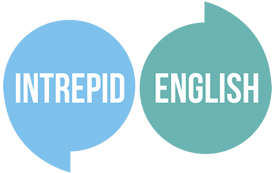“The past, the present and the future walked into a bar. It was tense!”
There is no denying that the English language has become a dominant language in the world today.
That is why you want to learn it.
In order to communicate well in English though, it is essential to have a good understanding of the verb tenses. But, why are verb tenses so important in English?
Without proper use of the past, the present and the future, you cannot express your meaning correctly. The tense shows the time of an action that is shown by the verb.
When you master the 12 different tenses in English, you master the English language. Fact.
Why are verb tenses important in English?
There are 3 main tenses in English: the past, the present & the future.
Each has four forms: simple, continuous, perfect and perfect continuous.
Types of tenses:
1. The Present Tenses:
• Present simple tense: It is used to explain an action, event or condition that is true & constant in the present. For example, I eat breakfast every morning.
• Present continuous tense: It describes an ongoing action happening around now. For instance, I am eating my breakfast right now.
• Present perfect tense: It indicates an action that began in the past and continues into the present. For example, I have already eaten my breakfast this morning.
• Present perfect continuous tense: It is used to describe an action that has been taking place for some time and is still ongoing now in the present or recently stopped. For example, I have been eating a healthy breakfast for the past few months now and I feel the difference.
Watch an overview of the present tenses in this video lesson on our YouTube channel:
2. The Past Tenses:
• Past simple tense: It is used to explain an event or an action that has happened in the past. For example, I ate a lot yesterday.
• Past continuous tense: It is used to describe an event or an action that happened around a point in the past. For instance, I was eating my breakfast when you called.
• Past perfect tense: It refers to an action or event that took place before a point in the past. For example, I had already eaten my breakfast when I realised the milk was bad.
• Past perfect continuous tense: It describes a continuing action in the past that continued up to a point in the past. For instance, I had been eating my breakfast for 5 minutes when I realised I was eating the wrong cereal.
Watch an overview of the past tenses in this video lesson on our YouTube channel:
3. The Future Tenses:
• Future simple tense: It is used when we decide to do something now in the future. For example, I will eat some toast this morning.
• Future continuous tense: It describes a continuing action that will happen around a point in the future. For instance, I will be eating my breakfast at 8 o’clock tomorrow morning.
• Future perfect tense: It refers to an action that will be completed by a point in the future. For example, I will have finished my breakfast by 9 o’clock tomorrow morning.
• Future perfect continuous tense: It refers to an action that will be completed by a point in the future and the focus is on the length of time it took to complete. For instance, I will have been eating my breakfast for eating healthily for 6 months this time next week.
Watch an overview of the future tenses in this video lesson on our YouTube channel:
As you can see each tense is different but it can be confusing especially when you translate literally from another language.
The best top tip is to think in English and not translate. Plus practice, practice and practice until the tenses become a reflex.
In need of practicing the different tenses? Look no further as we have created a new Fast Grammar course for you covering each of the tenses in detail with explanations, examples, videos and exercises so that you can become an expert in the verb tenses in English and therefore an expert in English!
Intrepid English Members can access the course right here!

